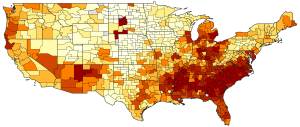Trying to reach the bottom rung of the economic ladder
Posted: July 25, 2013 Filed under: Employment, Income Leave a comment »
Rodney Moore of New Haven Family Alliance, speaking with participants in the Project Success program
A report out this week by researchers at Harvard and U.C. Berkeley found the chance that someone born into the bottom fifth of the economic ladder in Connecticut could rise to the top fifth is about 8%. For some young low-income people, even the bottom rung of that economic ladder feels out of reach. One program in New Haven is working to help them start that climb.
Listen to Craig LeMoult’s story here:
The New Haven Family Alliance runs a program called Project Success to help young people who don’t see a path for themselves to jobs in the regular economy. Economists say even with a regular job, climbing out of poverty is a challenge.
Despite disparity, Conn. not the hardest place to move up economic ladder
Posted: July 25, 2013 Filed under: Uncategorized Leave a comment »A report out this week by researchers at Harvard and U.C. Berkeley examines the ability of people to move up the economic ladder in metro areas around the country. They found striking differences in upward mobility based on where in the country people live. This map from the study illustrates the regional differences. The red spots are where it’s hardest to move up, and the lighter areas are where that kind of mobility is easier.

There’s a New York Times interactive map and article on the study here.
Interestingly, although Connecticut has one of the greatest economic disparities in the country, as you can see on that map, it’s not one of the hardest places to move up the economic ladder. The study found that in the Bridgeport area (the one area of Connecticut included in the study) the chance that someone in the bottom fifth of the economic ladder could rise to the top fifth is about eight percent. Compare that to Atlanta, which is just four percent. The study says Bridgeport kids who grow up in the first percentile in income, just $2,000 a year, will end up, on average, in the 35th percentile.
Coming up shortly on WSHU’s State of Disparity, we’ll take a look at efforts to help young people who are having trouble even reaching the bottom rung of the economic ladder.

Recent Comments